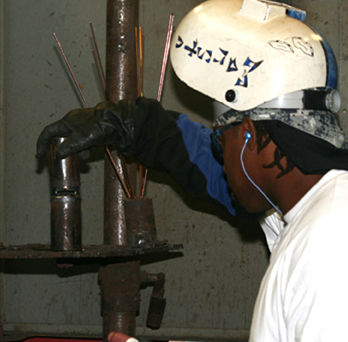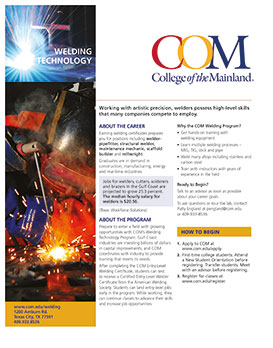Welding
About the Career
Working with artistic precision, welders possess high-level skills that many companies, especially those in manufacturing, compete to employ. The overall employment of welders, cutters, solderers and brazers in the Gulf Coast from 2011 to 2020 is projected to grow 26.7 percent.
The median hourly wage for welders is $17.93. (Source: Workforce Solutions 2014)
Earning welding certificates prepares you for positions including welder-pipefitter, structural welder, maintenance mechanics, scaffold builders and millwrights.
Graduates are in demand in a variety of settings:
- Oil and Gas
- Construction
- Manufacturing and Production
- Power Plants
- Energy Exploration
- Maritime Industry
About the Program
Prepare to enter a field with growing opportunities with College of the Mainland’s Welding Technology Program. Gulf Coast industry facilities are investing billions of dollars in capital improvements, and COM coordinates with industry to provide training that meets its needs.
After completing the COM Entry-Level Welding Certificate, students can test to receive a Certified Entry-Level Welder Certificate from the American Welding Society. Students can land entry-level jobs early in the program. While working, they can continue classes to advance their skills and increase job opportunities.
Fact Sheet
From Our Graduates

“I didn’t see myself before I came to College of the Mainland making $5,000 a week like I am now. It all started here.”

“When I got here, I didn’t know anything about welding. (The instructors) taught me perseverance. They never let me quit. They teach you to be confident in yourself.”

